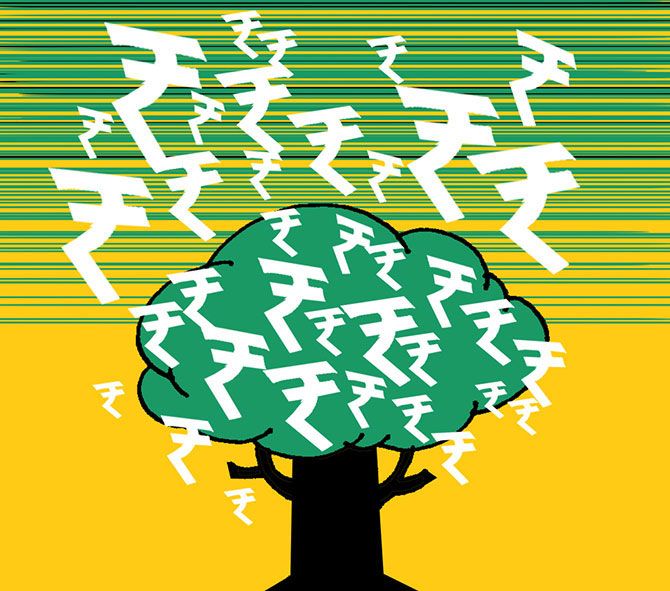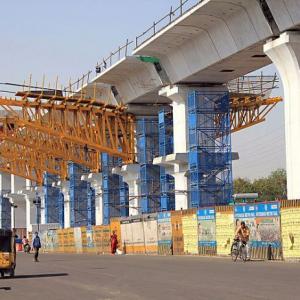Wonder why corporate India is showering dividends on shareholders?
Krishna Kant and Ashley Coutinho find out.<br

Corporate India is using higher dividends to reward shareholders, even as earnings growth remains elusive.
The dividend payout ratio for the country's top listed companies reached an all-time high of 40.5 per cent in FY16, from the low of 20 per cent in FY08.
In all, shareholders earned Rs 1.56 lakh crore as equity dividend in FY16 -- nearly double the Rs 89,000 crore dividend payout in FY11.
Corporate India's earnings were stagnant during the period, declining from Rs 3.97 lakh crore in FY11 to Rs 3.86 lakh crore the last financial year.
In the past five years, the total dividend payout has grown at a compound annual growth rate of 11.9 per cent, against a 0.6 per cent annualised decline in reported net profit during the period.
In all, shareholders earned Rs 1.56 lakh crore as equity dividend in FY16 -- nearly double the Rs 89,000 crore dividend payout in FY11.
Corporate India's earnings were stagnant during the period, declining from Rs 3.97 lakh crore in FY11 to Rs 3.86 lakh crore the last financial year.
"It is a positive trend and is in keeping with the global culture of keeping low cash on balance sheets," said Anand Shah, deputy chief executive officer, BNP Paribas Mutual Fund.
The trend has only strengthened in the current financial year (FY17).
Interim dividend payout by companies is up 40 per cent during the first nine months of FY17; 166 companies have declared interim dividend so far, up from 153 during the same period last year (FY16).
In all, companies have already distributed around Rs 50,300 crore as interim dividend in FY17, equivalent to around a third of the full-year dividend payout in FY16.
The payout ratio is the proportion of the current year's net profit that companies distribute as equity dividend to shareholders.
The analysis is based on the common sample of 953 companies that are part of the BSE 500, BSE MidCap and BSE SmallCap Index. All numbers are on a consolidated basis, wherever possible.
The ratio would rise further if we include share buybacks, another way companies put cash in the hands of shareholders.
Companies have announced a share buyback worth Rs 51,725 crore in the nine months ended December 2016, against Rs 3,849 crore during the corresponding period of the previous year.
Of this, Rs 26,743 crore has already been utilised by companies, up from Rs 3,461 crore the last financial year.
According to Morgan Stanley estimates, in the past 12 months, 90 per cent of corporate profits have been paid out to shareholders.
More than half of this payout has happened through buybacks.
'Free cash flow turned positive a couple of years ago and reflects improving operations and depressed capital expenditure (capex). Over the past 12 months, companies have preferred to pay out this free cash flow. The lack of growth signals and attractive stock valuations explains this,' wrote Morgan Stanley equity strategists Ridham Desai and Sheela Rathi in a recent research note.
"At the end of the day, if companies don't have enough growth opportunities in their existing businesses then it's better to give back the money to shareholders rather than invest it in unrelated businesses and lose money, which has been the trend in India for many years," added BNP Paribas Mutual Fund's Shah.
According to analysts, higher payout reflects the management's desire to keep shareholders happy, besides the lack of investment opportunity in a slow-growing economy.
Higher dividends are good, provided they are consistent and not seen as a one-off by investors.
"There is a close relationship between the corporate capex cycle and the dividend payout ratio. A higher ratio indicates companies see fewer opportunities to companies' cash pile in new projects or acquisitions; so, they are returning the surplus cash to shareholders," said G Chokkalingam, founder and chief executive officer, Equinomics Research & Advisory.
"Companies can pay higher dividends to instil confidence in shareholders. But higher dividends are good, provided they are consistent and not seen as a one-off by investors," said Ravi Gopalakrishnan, head -- equities, Canara Robeco Mutual Fund.
"If the economic activity picks up and the capacity utilisation rises to optimal levels," he added, "that's when companies will utilise the cash for capex rather than paying dividends."
"Earnings growth is gaining momentum and is likely to pick up pace in the second half of FY18," Gopalakrishnan felt.
Future capex, however, could become a victim of companies declining retained earnings.
A higher payout ratio, coupled with poor profitability, has led to a steady decline in corporate India's retained earnings -- the proportion of net profit retained for future use.
Retained earnings were down 9.2 per cent in FY16 and it has shrunk at an annualised rate of 5.7 per cent in the past five years, falling from a record high of around Rs 3.08 lakh crore in FY11 to around Rs 2.29 lakh crore in FY16.
The figures would be even lower, if adjusted for dividend distribution tax of 17 per cent, including cess.
This is likely to hurt companies' ability to ramp up capex, once the growth cycle resumes.










